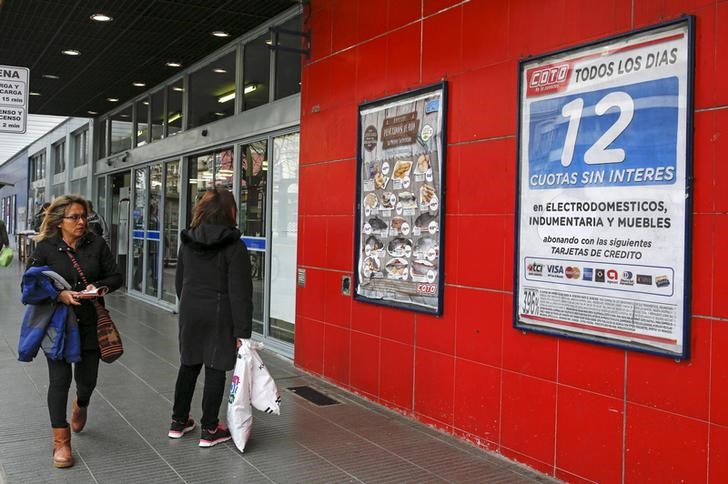By Hugh Bronstein
BUENOS AIRES (Reuters) - The front-runner in Argentina's presidential election campaign is unnerving investors with his silence over the country's notoriously inaccurate inflation reporting, while the second place candidate says data transparency would be a top priority.
Official recognition that Argentina has one of the world's highest inflation rates would help improve a business climate tattered by heavy government controls and repeated sovereign debt defaults.
Buenos Aires Governor Daniel Scioli leads the campaign ahead of the Oct. 25 election. He is seen as more friendly towards business than outgoing leader Cristina Fernandez, who has endorsed him.
But Scioli fuelled jitters in the bond market and contributed to a drop in the local peso
Scioli's closest rival for the presidency, Buenos Aires Mayor Mauricio Macri, has meanwhile pounced on the issue. He bills himself as a clear change from Fernandez, whose trade and currency controls have slowed South America's second biggest economy to a crawl.
"We will restore INDEC's autonomy, not only to increase transparency but as a key step towards reducing inflation," a Macri campaign spokesman told Reuters. The Scioli campaign did not respond to repeated requests for comment.
INFLATION SEEN AMONG HIGHEST IN WORLD
INDEC says consumer prices rose 15 percent in the 12 months through June while private economists estimate inflation at 27.9 percent, one of the highest rates in the world. Critics, including some of the agency's own statisticians, say INDEC is masking Argentina's top economic problem for political reasons.
Constitutionally barred from seeking a third consecutive term in October, Fernandez could run again in 2019 and is manoeuvring to retain influence after the next government is seated on Dec. 10.
She has stacked her Front for Victory party's ticket of congressional candidates with her closest allies and hand picked Scioli's running mate from her inner circle.
Inaccurate inflation, growth and poverty reporting has been an open secret since Fernandez took office in 2007. She sparked howls from the opposition last month when she said Argentina had a lower poverty rate than Germany.
"It would be difficult for Scioli to quickly differentiate himself from the current government in matters of transparency,"
said Pablo Secchi, executive director of Poder Ciudadano, the local chapter of Transparency International.
"His running mate and the congressional candidates on his ticket would limit his ability to act, if he even wants to act," Secchi said. "Scioli would not have a mandate to break away from Fernandez, whose policy has been to lie about economic data."
On the other hand, Scioli would have little hope of improving Argentina's economy and winning re-election without recognising and battling inflation.
"I assume data transparency under any candidate next year," said Siobhan Morden, who analyses Argentina for investment bank Jeffries LLC.

"It's a relatively easy fix to improve investor/business confidence and its a typical political tactic to show the true extent of economic deterioration, and blame it on the previous administration," Morden added. "It would also raise the necessary awareness to begin the adjustment process.